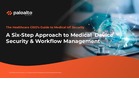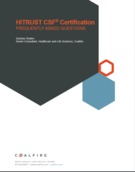Essential Guide to HIPAA Compliance and Data Protection Strategies
By: TechTarget Health IT and TechTarget Security View more from TechTarget Health IT and TechTarget Security >>
Download this next:
Scale Your SOC with Cortex Xpanse and Cortex XSOAR Healthcare
By: Palo Alto Networks
Type: eBook
Between unencrypted medical IoT device traffic, healthcare VLANs mixing IoT and IT assets, and a prevalence of healthcare devices running outdated and insecure operating systems, the case for healthcare organizations as an attractive target for adversaries is strong.
Discover how automating attack surface management can address these unique security challenges for healthcare organizations in this e-book.
These are also closely related to: "Essential Guide to HIPAA Compliance and Data Protection Strategies"
-
A 6-step approach to medical device security
By: Palo Alto Networks
Type: eBook
In just the past few years, the number of healthcare records exposed in data breaches has increased over 400%. The main factor in a lot of these breaches ends up being unprotected IoT medical devices such as imaging systems and infusion pumps, or perhaps more common devices like security cameras and printers.
In this e-book, you will learn about the many challenges that healthcare CISOs must overcome to ensure that their connected devices are both saving patients and protecting the entire organization from security breaches.
Read on to learn more about the factors that put your medical IoT devices at risk, and how you can overcome these challenges by adopting a new security paradigm.
-
HITRUST CSF Certification: Most commonly asked questions
By: Coalfire
Type: White Paper
The Health Information Trust Alliance (HITRUST) is a necessary roadmap for organizations that process, transmit, and store Protected Health Information (PHI).
The HITRUST Common Security Framework (CSF) was developed by IT and healthcare professionals to provide a framework for managing the security requirements inherent in the Health Insurance Portability and Accountability Act (HIPAA).
As with any complex framework, there are often questions regarding different aspects, such as how to obtain certification, some of the issues surrounding the CSF and the relationship between HIPAA and HITRUST
Access this white paper to discover the answers to these frequently asked questions.
Find more content like what you just read:
-
Secure texting: The next great healthcare communications frontier
By: AVST
Type: eGuide
In this expert e-guide, learn why the first step to secure communications technology (like texting) is convincing leaders and clinicians to recognize the risks to health data.
-
8-page paper: Healthcare cybersecurity insights
By: CyberMaxx
Type: White Paper
To deepen your understanding of the state of cybersecurity in the healthcare industry, and to learn about 3 major security risks, download this 8-page white paper.
-
Zero Trust recommendations for healthcare IoT
By: Palo Alto Networks
Type: White Paper
Though the adoption of IoT devices has revolutionized healthcare, it has also increased healthcare organizations’ exposure to cyberthreats. So, how can these organizations secure their IoT devices? Dig into this white paper to learn how Zero Trust can help.
-
The CISO’s essential guide to medical device security
By: Palo Alto Networks
Type: eBook
Download this e-book, the 2023 Gartner® Market Guide for Medical Device Security Solutions, to discover how you can stay ahead of the game and enhance your medical device security strategy.
-
Checklist: The must-have medical IoT security features
By: Palo Alto Networks
Type: White Paper
Despite the many solutions on the market, organizations big and small struggle to find the right Internet of Things (IoT) security tool for their specific organizational needs. This Request for Information (RFI) checklist documents must-have IoT security features and capabilities to look for before committing to an IoT security tool.
-
Protect your critical medical devices from rising cyber threats
By: Palo Alto Networks
Type: eBook
Discover in this e-book how you can minimize your exposure to ransomware and other cybercrime, simplify compliance, and protect the devices that deliver better patient outcomes.
-
E-Guide: Steps to securing your file transfers and meeting compliance requirements
By: TechTarget Security
Type: eGuide
Security has become a main issue with the swift way we have started working, making data transfers less safe. Read this expert E-Guide and learn the steps necessary to secure your managed file transfers and meet compliance requirements.
-
Data Protection 101: Essential Steps for Holistic Information Security
By: TechTarget Security
Type: eGuide
Data protection strategies should not only focus on safeguarding corporate information, but also identifying sensitive records that are subject to regulatory controls. This e-guide offers a comprehensive overview of data protection best practices for ensuring both security and compliance.
-
Securing the enterprise application layer: Expert Guidelines
By: TechTarget Security
Type: eGuide
If you're a security professional, the focus on application security in IT these days may leave you feeling out of the loop. Yet, in many cases, application security pros rely on the infrastructure team to provide a secure foundation. Find out how securing a naming and directory service will help build a solid platform that application can trust.
-
E-Book: Technical Guide on PCI
By: TechTarget Security
Type: eBook
TechTarget’s Security Media Group presents a global look at PCI, and how it is impacted by today’s evolving business needs. Our technical editors from the U.S., Europe, India and Asia provide their respective regions’ perspective on PCI compliance.
-
Guide to optimizing data storage & retrieval for compliance
By: Utimaco
Type: Product Overview
Retention of sensitive data has become a vital requirement for the automotive industry and relevant compliance. While much of the data required is already stored within existing backup operations, these systems are not designed to accommodate the needs of compliance initiatives. Read on to learn how Utimaco has addressed these challenges.
-
How to create an effective data protection strategy for IT compliance
By: TechTarget Security
Type: eGuide
Data protection strategies should not only focus on safeguarding corporate information, but also identifying sensitive records that are subject to regulatory controls. This tip guide offers a comprehensive overview of data protection best practices for ensuring both security and compliance.
-
eGuide: Email Security and Compliance Best Practices
By: TechTarget Security
Type: eGuide
Secure and compliant email systems are essential for financial services companies. In this two part series on email security best practices, expert George Wrenn discusses how to capture emails, securely archive the messages and detailed reporting.
-
Prepare to meet evolving risk and compliance mandates
By: ServiceNow
Type: Product Overview
To meet government disclosure mandates, firms require integrated risk and security programs. With a centralized platform, ServiceNow helps identify threats, contain incidents, ensure compliance, and report material events within required timeframes. Case. Read more about how ServiceNow enables robust risk management and expedites reporting.
-
Creating a Compliance Culture: Best Practices
By: TechTarget Security
Type: eGuide
Check out this E-Guide and learn key tips on how to make sure your compliance culture is operating efficiently.
-
Healthcare security: Mission critical
By: ARG, Inc.
Type: Case Study
Read this case study to learn how ARG helped AbsoluteCare, a leading healthcare provider for vulnerable populations, find the best match for their infrastructure and security needs.
-
Enhance cyber transparency with a cyber range
By: SimSpace
Type: Data Sheet
Public companies must file a quarterly financial report with the Security and Exchange Commission (SEC). In their new disclosure rules, the SEC has officially recognized the unique risks posed by inadequate cybersecurity policies. Download this data sheet to learn how using a cyber range can help prepare your security in the face of an attack.
-
How telecommunication services and law enforcement work in tandem
By: Utimaco
Type: Product Overview
Lawful Interception (LI) refers to the legally mandated surveillance of telecommunication services. The UTIMACO Lawful Interception Management System (LIMS) is a monitoring solution designed to help telecom operators and Internet service providers fulfill their legal obligation to Law enforcement agencies (LEAs). Download now to learn more.
-
E-Guide: Achieving compliance through IAM
By: TechTarget Security
Type: eGuide
Read this expert E-Guide to learn the best practices for using role management as a tool to meet compliance regulations.
-
How to navigate turbulent times in business
By: Contrast Security
Type: White Paper
In the past few years, there have been several significant disruptions to global markets. With events creating uncertainty and fear, and with new technology emerging at a rapid pace, businesses must adapt, grow, and be more resilient than ever before. Read on to learn how to overcome these challenges with an enhanced security posture.
-
How to approach FedRAMP to maximize your results
By: Coalfire
Type: White Paper
For organizations that do business with the US government, then you’re aware of FedRAMP as their center of IT modernization. Their Cloud Smart policy requires that agencies use FedRAMP authorized solutions. To not miss out on these opportunities, leaders can ensure their business approaches FedRAMP the right way. Read on to learn how.
-
Managing M&A Risk
By: Tanium
Type: White Paper
To optimally manage cyber risk in the mergers and acquisitions process, acquiring organizations need a rapid, accurate way to map all the endpoint assets in a target company. Read about how this is done in Managing M&A Risk: How Endpoint Visibility Can Deliver Critical Advantages.
-
Internal Controls Checklist for Corporate Data Protection and Compliance
By: TechTarget Security
Type: eGuide
In this expert tip, Eric Holmquist details four key governance items that should be on every enterprise’s internal controls checklist to ensure corporate data protection.
-
Cyber insurance: Heads they win, tails they win, too?
By: Tanium
Type: White Paper
“Insurance, as it’s currently practiced, is usually heads they win and tails they win, too,” explains cybersecurity expert Eric Gyasi to Tanium’s magazine Focal Point. “Cyber has upended that model quite a bit.” In this white paper, discover strategies for navigating the tricky terrain of cyber insurance.
-
Understanding Your PCI DSS Guidelines: Successes and Failures
By: TechTarget Security
Type: eGuide
This expert guide form SearchSecurity.com details the PCI validation requirements for merchants covered by PCI DSS and reviews PCI's success and failures. Read on to learn what needs to be improved upon and what remains effective.
-
217 IT directors’ insights on software supply chain security
By: Sonatype
Type: Research Content
How are regulatory initiatives like the Biden administration’s “Securing Open Source Software Act” impacting software development and security? To find out, Censuswide surveyed 217 IT directors. Review the findings in this 9-page report by Sonatype.
-
Guide to the NYDFS Cybersecurity Regulations
By: Redjack
Type: White Paper
Recently, the New York State Department of Financial Services (NYDFS) introduced an update to its cybersecurity regulations, adding requirements to ensure against growing concerns. Download this white paper for a full breakdown of the new changes.
-
Guide to the Cybersecurity Maturity Model Certification (CMMC) compliance
By: Scalepad Software
Type: White Paper
The Cybersecurity Maturity Model Certification (CMMC) framework is designed to support and guide MSPs working with the US Department of Defense. This white paper presents a guide to the CMMC, breaking down the essential information so that you can navigate its more complex features. Read on to learn more.
-
Cloud unified communications will top $19 billion by 2027
By: Theta Lake
Type: Research Content
As organizations continue to emphasize and invest in unified communications, compliance complications often present IT teams with a challenging binary: Security or user experience. But what if you didn’t have to compromise? Download to see how you can solve communication compliance challenges, without sacrificing employee experience.
-
How to achieve compliant communication
By: Theta Lake
Type: White Paper
Working closely with Microsoft, Theta Lake offers modern, AI-enabled compliance and security capabilities that enable organizations of all sizes to use the full breadth of Microsoft Teams capabilities. Download this white paper to learn more about Theta Lake’s approach to compliant communication.
-
FedRAMP compliant UC
By: ARG, Inc.
Type: Case Study
A top 10 federal defense contractor with over 20,000 employees was managing a complex environment with large Avaya and Cisco footprints for PBX and contact center. They required a FedRAMP environment that provided a seamless consolidation of collaboration, conferencing and voice. Download this case study to learn how they got it.


